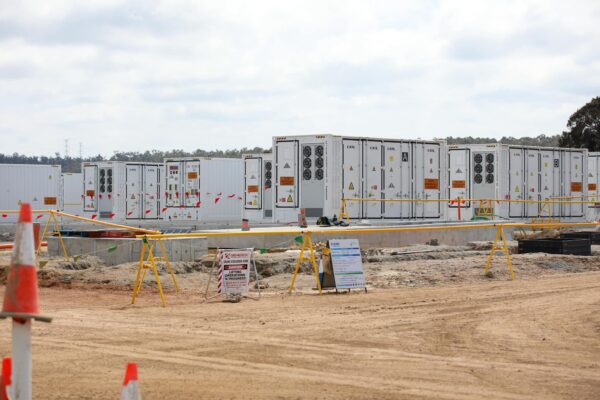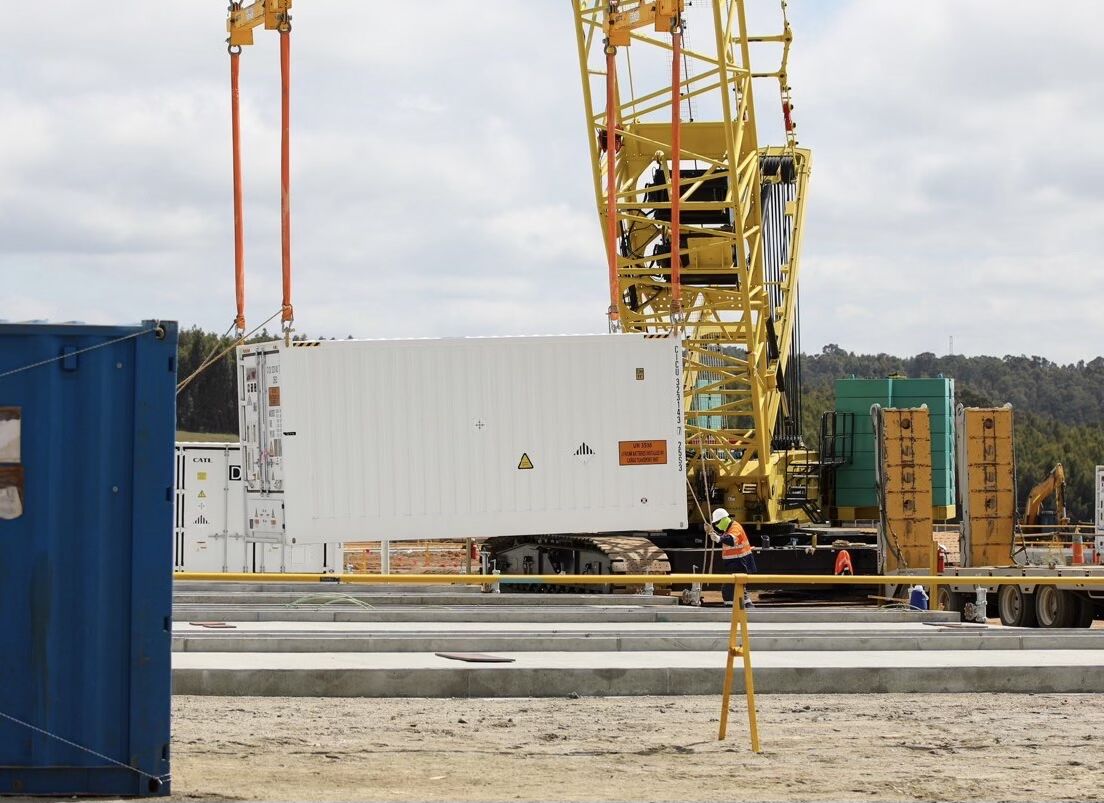Western Australian (WA) government-owned utility Synergy has received the first 80 of 640 containerised battery units at its Collie battery energy storage system (CBESS), located 200 kilometres south of Perth and 16 kilometres northeast of coal mining town Collie.
Delivered via the Bunbury Port 75 kilometres west of the facility, the $1.6 billion (USD 1 billion) large-scale CBESS will provide 500 MW of power for up to four hours with 2000 MWh of energy storage, giving stability and support for continued uptake of renewable electricity generation in the South West Interconnected System (SWIS).
Accounting for 500 jobs during the construction phase, CBESS is scheduled to install the last unit and switch on the battery in 2025.
WA Premier Roger Cook said the Collie battery will be one of the biggest in Australia contributing to a future for the state where clean energy can be delivered affordably and reliably.
“Importantly, this big battery keeps Collie at the heart of our energy system, supporting local jobs and ensuring a strong future for the town,” Cook said.

Image: Synergy
WA Energy Minister Reece Whitby said large-scale storage is important because it supports household investment in rooftop solar and allows the state to continue its phased transition out of coal by 2030.
“By installing these containerised battery systems in Collie, Synergy is one step closer to securing a cleaner energy mix that can provide power to the system when it’s most needed,” Whitby said.
The CBESS is Synergy’s third utility-scale battery project, adding to its 100MW / 200 MWh Kwinana BESS System 1 (KBESS1), 30 kilometres south of Perth, and the 200 MW / 800 MWh KBESS2, which is using China-headquartered Contemporary Amperex Technology (CATL) Enerc Plus, containerised liquid-cooling battery systems, and USA-based Power Electronics inverters.
Combined the Kwinana BESS will be capable of powering the equivalent of 530,000 homes, while the CBESS can power approximately 785,000 homes for four hours.
Collie-Preston Local Member Jodie Hanns said Collie has played an important role in the electricity system of Western Australia over the past century.
“The installation of the Collie battery is the next chapter in Collie’s energy story – which means the town will continue to play an important role in the energy needs of the state,” Hanns said.
“It’s great to see this project also generating work for local businesses, employees and contractors.”
Collie Industrial Transition Fund
The CBESS’s progress coincides with a new WA government $134 million injection into the transition of Collie in the lead up to 2030, when all WA state-owned coal-fired power stations will close.
Through its Collie Industrial Transition Fund, $8.3 million has been allocated to secure 155 hectares of the local Coolangatta Industrial Estate (CIE) land, for future major project proponents.
A further $8.5 million has been allocated to support the design of essential infrastructure upgrades to the CIE, while a remaining $117.2 million has been set aside to deliver the works.
Cook said the government is seeing significant interest from industrial projects looking to establish in Collie, with Green Steel of WA and Magnium Australia finalising feasibility studies.
“This commitment will help to secure Collie’s future as an industry hub, putting its skilled workforce to best use and setting up this town for the long term,” Cook said.
French renewable energy and storage developer Neoen is also building a utility-scale 560 MW / 2,240 MWh BESS 17 kilometres northeast of Collie, and 13 kilometres northeast of CBESS, co-developed with Western Power, UGL and Tesla.
Updated: 9 October 2024
This content is protected by copyright and may not be reused. If you want to cooperate with us and would like to reuse some of our content, please contact: editors@pv-magazine.com.








By submitting this form you agree to pv magazine using your data for the purposes of publishing your comment.
Your personal data will only be disclosed or otherwise transmitted to third parties for the purposes of spam filtering or if this is necessary for technical maintenance of the website. Any other transfer to third parties will not take place unless this is justified on the basis of applicable data protection regulations or if pv magazine is legally obliged to do so.
You may revoke this consent at any time with effect for the future, in which case your personal data will be deleted immediately. Otherwise, your data will be deleted if pv magazine has processed your request or the purpose of data storage is fulfilled.
Further information on data privacy can be found in our Data Protection Policy.